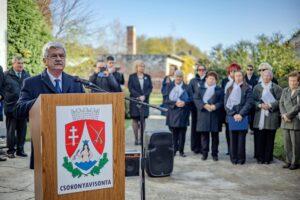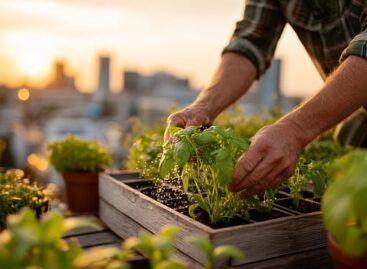The agrarian reforms of 100 years ago still carry an important message today
“We remember a forward-looking thinker who laid the foundation for the concept of rural development and ecological sustainability,” said Sándor Farkas, deputy minister of the Ministry of Agriculture, at the commemoration held on Saturday, on the occasion of the 100th anniversary of the death of István Szabó Nagyatádi, in Csokonyavisonta, Somogy county.

(Photo: AM/Tibor Vermes)
In his festive greeting, the deputy minister emphasized that István Nagyatádi Szabó was one of the most important peasant politicians in Hungarian history, a respected leader of the small farming society. He also wrote his name in history as Minister of Agriculture and founder of the Small Farmers’ Party. He always fought his political struggles for the interests of Hungarian farmers, treating his homeland as the basis of his life. He added that many measures belonged to his name: in connection with the land reform of 1920, he provided land to the peasantry, thereby reducing the predominance of large estates. He had the issue of afforestation of the Great Plain close to his heart, and afforestation and irrigation programs were started throughout the country under his ministry. He advocated the creation of cooperatives and winter agricultural schools, distributed improved seed among farmers, brought agriculture to legal representation by setting up agricultural chambers, reorganized the forestry administration and introduced a new wine law. Today we would say that he created a sustainable agricultural policy – added Sándor Farkas. “Hungarian land belongs to Hungarian farmers. They ensure the future of Hungarian agriculture, and thus the future of all of us.” As István Nagyatádi Szabó always proclaimed: they are the sustaining power of the Hungarian countryside – emphasized the deputy minister. Sándor Farkas said that his commitment to the countryside carries a valid message even today: the strengthening of rural communities is essential for preserving national sovereignty and economic independence. Today, as global food supply chains face challenges, it becomes even more important to respect and support small producers who are the bastions of national food self-sufficiency.
AM
Related news
State compensation for the victims of Bászna Gabona Zrt. has been completed
🎧 Hallgasd a cikket: Lejátszás Szünet Folytatás Leállítás Nyelv: Auto…
Read more >József Viski: Adaptation and competitiveness are key for the horticultural sector
🎧 Hallgasd a cikket: Lejátszás Szünet Folytatás Leállítás Nyelv: Auto…
Read more >In 2025, FruitVeB considered the support and professional coordination of the TÉSZs as its priority task
🎧 Hallgasd a cikket: Lejátszás Szünet Folytatás Leállítás Nyelv: Auto…
Read more >Related news
Focus on the domestic fishing sector at SIRHA Budapest
🎧 Hallgasd a cikket: Lejátszás Szünet Folytatás Leállítás Nyelv: Auto…
Read more >High-protein products are taking over
🎧 Hallgasd a cikket: Lejátszás Szünet Folytatás Leállítás Nyelv: Auto…
Read more >








